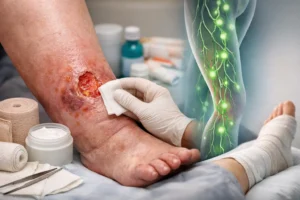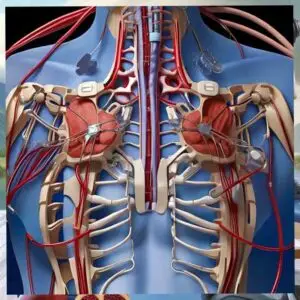Hydration plays a pivotal role in maintaining overall health. The human body relies on water for various functions, from regulating body temperature to transporting nutrients. Staying properly hydrated can have a profound impact on managing lymphedema. This article will explore the connection between hydration and lymphedema treatment, shedding light on why adequate fluid intake is vital for those affected by this chronic condition.
Importance of Hydration in Overall Health
Water makes up about 60% of the human body and is essential for nearly every biological process. From facilitating digestion and nutrient absorption to supporting joint health, hydration impacts nearly every system in the body. Staying hydrated helps keep our organs functioning optimally, aids in detoxification, and maintains healthy skin. Our body struggles to carry out these basic functions without adequate hydration, leading to various health issues.
Purpose of the Blog Post: Exploring the Connection Between Hydration and Lymphedema Treatment
This blog post will focus on how staying hydrated directly influences the management and treatment of lymphedema. We will explore the scientific basis behind hydration’s role in lymphatic function, highlight the specific benefits of hydration for lymphedema patients, and provide practical tips for maintaining optimal hydration levels.
Understanding Lymphedema
Definition and Causes of Lymphedema
Lymphedema is a condition that occurs when the lymphatic system, responsible for draining excess fluid from tissues, is damaged or impaired. This can lead to the accumulation of lymph fluid in tissues, resulting in Swelling. Lymphedema is commonly caused by:
- Surgical removal or radiation of lymph nodes: During cancer treatments, lymph nodes are often removed or damaged.
- Infection: Which can damage lymphatic vessels.
- Trauma or injury to the lymphatic system.
Sometimes, lymphedema can be present at birth (primary lymphedema), but it is most commonly secondary to other medical conditions or treatments.
Symptoms and Effects on Daily Life
Lymphedema typically manifests as Swelling, often in the arms, legs, or other parts of the body, depending on where the lymphatic system is impaired. Other common symptoms include:
- Heaviness or tightness in the affected limb.
- Reduced range of motion, making daily tasks like walking or dressing more difficult.
- Skin changes, such as thickening or hardening, can make the skin more vulnerable to infections.
The Swelling associated with lymphedema can be uncomfortable and, if left unmanaged, can affect mobility, self-esteem, and overall quality of life.
Importance of Early Diagnosis and Management
Early detection and proactive management of lymphedema are crucial to reducing its impact. If left untreated, the condition can progress and lead to complications such as skin infections, fibrosis (thickening of the tissue), and, in severe cases, lymphangitis. Managing Swelling and fluid retention is key to preventing these complications, and one of the simplest ways to support lymphedema treatment is through proper hydration.
The Role of Hydration in the Body
Overview of Hydration and Its Significance
Hydration is not just about quenching thirst. It involves maintaining a balance of water in the body to support essential bodily functions. Every cell in the body depends on water to perform its tasks, and dehydration can lead to several issues, including fatigue, poor digestion, and impaired kidney function.
Adequate hydration helps regulate blood pressure, maintain body temperature, and support cellular functions. It also aids in the removal of toxins and waste products from the body, ensuring that the organs and systems are running efficiently.
How Hydration Affects Bodily Functions
Water is essential for several processes:
- Nutrient and oxygen transport: Water helps carry vital nutrients and oxygen to cells, which is crucial for overall health.
- Detoxification: The kidneys, liver, and other organs rely on proper hydration to remove waste and toxins from the body.
- Circulation: Blood and lymph fluid are primarily composed of water. Maintaining hydration supports healthy Circulation and fluid flow throughout the body.
When properly hydrated, the body is better equipped to maintain these essential functions, and the lymphatic system is more efficient in draining excess fluid from tissues.
The Impact of Dehydration on Health and Wellness
Dehydration can hinder the lymphatic system’s ability to function properly. When you’re dehydrated, the body holds onto more water, contributing to Swelling and making lymphedema worse. Also, dehydration can lead to fatigue, dizziness, and cognitive impairment, affecting your overall quality of life.
Dehydration also increases the risk of developing infections, compromising the body’s ability to fight pathogens and maintain healthy skin. Lymphedema patients have an increased risk of complications like cellulitis and other skin infections.
How Hydration Supports Lymphedema Treatment
The Relationship Between Fluid Balance and Lymphatic Function
The lymphatic system is responsible for draining excess fluid from tissues. When this system is not functioning properly, fluid accumulates and causes Swelling. Hydration plays a key role in maintaining fluid balance in the body. When you stay hydrated, you help the lymphatic system function more efficiently by ensuring there is enough fluid for the system to transport and circulate.
Proper hydration supports the movement of lymph fluid, helping prevent excessive buildup and promoting fluid drainage. This is crucial for lymphedema patients, as treatment aims to reduce swelling and fluid retention.
Benefits of Staying Hydrated for Lymphedema Patients
1. Reducing Swelling
Adequate hydration helps keep the lymph fluid flowing smoothly, which can reduce the severity of Swelling. When you drink enough water, your body is less likely to retain excess fluid, which can ease the pressure and tightness in the affected limbs.
2. Enhancing Circulation
Hydration supports Circulation by ensuring blood and lymph fluid move freely through the body. Proper hydration helps maintain healthy blood volume, which allows nutrients and oxygen to reach tissues more effectively. This is particularly important for individuals with lymphedema, as poor Circulation can exacerbate fluid retention and Swelling.
3. Supporting Skin Health
Skin integrity is vital for those with lymphedema, as damaged skin is more susceptible to infections. Staying hydrated helps keep the skin moisturized and supple, reducing the likelihood of dryness, cracking, or irritation. Well-hydrated skin is also better equipped to heal if injuries or abrasions occur.
Practical Tips for Maintaining Proper Hydration
Staying hydrated may seem simple, but it requires consistency. Here are some practical tips to help you maintain proper hydration:
- Drink water regularly: Aim for at least 8-10 cups of water per day. You may need more if you’re active or live in a hot climate.
- Include hydrating foods: Incorporate foods like cucumbers, watermelon, oranges, and celery, which are high in water content, into your diet.
- Avoid dehydrating beverages: Limit caffeine, alcohol, and sugary drinks, as they can dehydrate the body.
- Carry a water bottle: Having a water bottle with you throughout the day can remind you to stay hydrated, especially if you’re on the go.
- Monitor your urine color: Clear or light yellow urine indicates proper hydration, while dark yellow or amber urine signals dehydration.
Conclusion
Hydration is a key factor in managing lymphedema and supporting the lymphatic system. Staying hydrated helps reduce Swelling, improve Circulation, and maintain healthy skin—all essential aspects of treating lymphedema effectively. By incorporating hydration into your daily routine, you can enhance the effectiveness of other treatments and manage the condition more effectively. Remember, proper hydration is not just about drinking water; it’s about maintaining a balanced fluid intake that supports overall health and well-being.
FAQs
1. How much water should I drink if I have lymphedema?
Aim for at least 8-10 cups of water daily, but this may vary depending on your needs. Talk to your healthcare provider for personalized recommendations.
2. Can dehydration worsen lymphedema symptoms?
Yes, dehydration can exacerbate swelling and fluid retention, worsening lymphedema symptoms. Staying hydrated helps reduce Swelling and supports lymphatic function.
3. What foods are best for staying hydrated?
Foods with high water content, like cucumbers, watermelon, oranges, and celery, can help keep you hydrated.
4. Can I drink other beverages besides water to stay hydrated?
While water is the best choice, you can also hydrate with herbal teas, coconut water, or hydrating fruits and vegetables. Avoid sugary drinks and caffeine, as they can lead to dehydration.
5. How do I know if I am properly hydrated?
Clear or light yellow urine indicates proper hydration, while dark urine may indicate dehydration. Also, if you’re feeling fatigued or dizzy, it could be a sign that you’re not drinking enough water.





